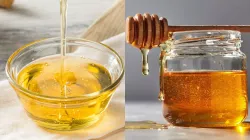Agave vs Honey: Which is healthier?
For years, honey was the go-to natural sweetener, seen as a more wholesome alternative to refined sugar. Then agave nectar emerged, touted for its low glycemic index. But is agave truly the better choice? Let's dive into the differences between these two popular sweeteners.

When it comes to choosing a natural sweetener, many people find themselves deliberating between agave nectar and honey. Both offer distinct flavours and are marketed as healthier alternatives to refined sugar. However, their health benefits and potential drawbacks can vary significantly. This article will explore the nutritional profiles and health benefits of agave and honey to help you make an informed decision.
Nutritional composition:
Agave nectar, primarily composed of fructose with some glucose and sucrose, boasts a lower glycemic index compared to many other sweeteners, resulting in a milder impact on blood sugar levels. In contrast, honey presents a mix of fructose, glucose, and sucrose alongside trace vitamins and minerals like vitamin C, calcium, and iron, varying based on floral sources. Though both present distinct nutritional profiles, honey slightly prevails due to its additional nutrient content, offering a touch of extra health benefits.
Caloric content:
Both agave and honey are dense in calories, with around 21 calories per teaspoon for agave and roughly 22 calories per teaspoon for honey, making them calorically similar. However, agave is slightly sweeter than honey, meaning you may use less of it, potentially reducing overall calorie intake. Therefore, in terms of calorie content, there's a tie between agave and honey, as both are close in their caloric density.
Antioxidant properties:
Agave nectar does contain some antioxidants, especially in darker varieties, but its levels generally pale in comparison to the diverse array found in honey. Honey's rich repertoire of antioxidants, including flavonoids and phenolic acids, not only aids in reducing inflammation but also plays a crucial role in mitigating the risk of chronic diseases. This stark contrast underscores honey's superiority in terms of antioxidant content, making it a more favourable choice for those seeking to bolster their health through natural sweeteners.
Impact on blood sugar:
Agave nectar, despite its low glycemic index, poses a concern for individuals with insulin resistance or diabetes due to its high fructose content, which can potentially contribute to metabolic issues with excessive consumption. Conversely, honey, with its moderate glycemic index, may cause a more noticeable spike in blood sugar levels compared to agave. However, its combination of fructose and glucose may offer a more balanced energy release, making it a preferable option for some.
Microbial properties:
Both agave and honey boast antimicrobial properties, making them valuable additions to the natural remedies toolkit. Agave nectar, despite possessing antimicrobial properties, might exhibit variability in efficacy due to factors such as processing methods and purity levels. Meanwhile, honey has stood the test of time as a renowned natural remedy, revered for its potent antimicrobial and antifungal attributes. These benefits are attributed to honey's low pH, along with the presence of compounds like hydrogen peroxide. Honey's extensive historical usage underscores its reliability in combating various ailments, while agave's antimicrobial potential remains promising but may require more consistent processing methods and purity for optimal effectiveness.
Both agave and honey have their merits and can be enjoyed in moderation as part of a balanced diet. However, when considering health benefits, honey often takes the lead due to its richer nutritional profile, antioxidant content, and potent antimicrobial properties. Agave may have advantages for individuals monitoring blood sugar levels due to its lower glycemic index, but it's essential to consume it in moderation and consider individual health needs and preferences when choosing between the two sweeteners. Ultimately, enjoying either in moderation and being mindful of overall sugar intake is key to maintaining a healthy lifestyle.
ALSO READ: Dried Herbs vs Fresh Herbs: Which one is better?